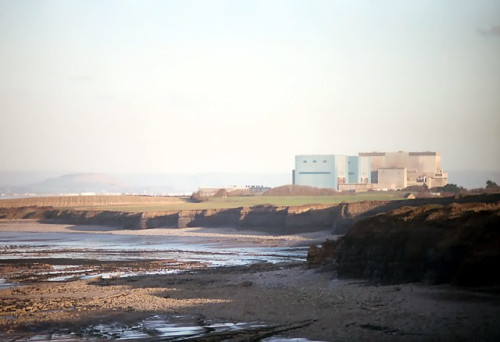
Gold coast: the Hinkley Point C power station will be built next to existing reactors in Somerset. (CC BY-SA 2.0 Richard Baker)
By Hamish Johnston
What will soon be the most expensive object on Earth? The answer, according to Greenpeace, is the Hinkley Point C nuclear power station that is slated for construction in south-west England. According to the BBC, the environmental group reckons the station will cost £24bn ($35bn) whereas EDF – the company that will build it – puts the construction cost at £18bn. In contrast, the Large Hadron Collider at CERN cost a mere £4bn. While the price tag on Hinkley Point C – which should produce 3.2 GW of electricity by 2024 – is eye watering, building a reactor on the cheap is not really an option.
Still, Hinkley Point C will not be the most expensive object ever built by humans. That honour goes to the International Space Station, which the BBC says cost nearly £78bn. There’s something comforting in knowing that the single highest expenditure ever has been on science – maybe civilization isn’t doomed after all.
“Publish or perish” is a phrase familiar to all academic physicists and reflects the pressure on researchers to compete for funding by publishing lots of papers, often at the expense of teaching or other university responsibilities. Over on A Quantum Diaries Survivor, particle physicist and veteran blogger Tommaso Dorigo looks back at his publishing output as he passes the 1000-paper milestone – at least in terms of papers on which he is listed as an author.
Dorigo has spent much of his career working on huge collaborations such as CMS at CERN and CDF at Fermilab, and in his blog he points out that he reviewed about 25% of those papers. He also says that he has scrutinized the results published in about 40 papers and was involved with the editing of more than 40. How many did he write himself? You will have to read “The number of my publications has four digits” to find out.
Some physicists love writing papers, and here’s a nice story on Twitter about a student who looks set to light up the literature. It’s by Robert McNees at Loyola University in Chicago who chided a student for delivering his homework assignments on extra-long sheets of paper. “Use regular size paper. You’re not writing the Magna Carta,” jibed McNees. Well, you can guess what happened next.
The Hinkley Point C should have two 1600MW each EPR reactors financed jointly by a Chinese company and the French company EDF costing $24 billion. Even with this amount, there are serious financial problems for the EDF, if the cost jumps to $35 billion, they will not be built! However, one may consider this information – even from the BBC, as a part of the disinformation compagne.
In the face of the obviously intentional misrepresentation of the project’s cost by Greenpeace, it is ironic, to be kind, that you would assert a wholly unsupported claim against the BBC. Such is the state of discourse in the darkling world of the 21st century, I suppose.
The BBC should have got and given the justification from the Greenpeace of this $35 billion cost of these two EPR reactors instead of the “official” $24 billion. Two of these reactors are being constructed in China on schedule under the announced budgetary and time conditions. The BBC should have looked into this for comparison, because the stakes very high the EPR.
It’s good to see that it is being built right next to the ocean and other older reactors.
As an ex motorcycle rider we had a saying. “There are two kinds of bikers. Those that have crashed, and those that are going to crash.
I studied physics at Penn State university. I was supposed to become a nuclear engineer until I found out how toxic nuclear waste was and how incredibly complex the mechanics and electrical systems are at a reactor.
Just because you can build a thing doesn’t mean you should. Fission reactors are too dangerous right now not because of the frequency of mishaps but because of the penalty for failure. Oh and we still don’t know what to do with the waste, or am I wrong?
BTW, I was one of America’s first Nuclear refugees as I was living near Three Mile Island when it went off. My professors at Penn State were laying odds on a total meltdown. Their joke? “That part of PA will be closed for 5000 years.” OOops.